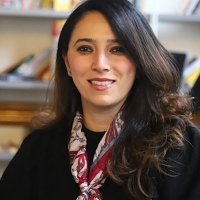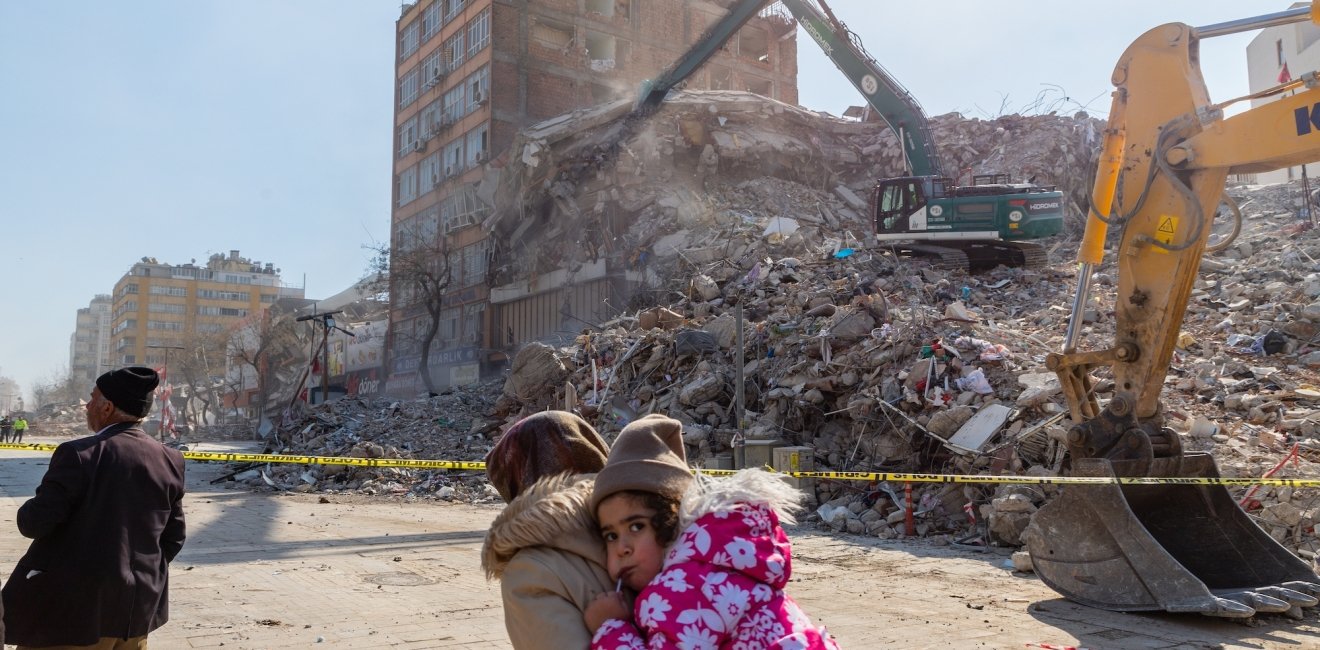
A blog of the Middle East Women's Initiative
“War is easier than an earthquake. You can’t escape the earthquake.” – Syrian refugee in Turkey
Over the past 12 years as war, violence, and mass displacement ravished my homeland. I thought Syrians had already suffered through every imaginable loss. But in the early hours of February 6, we witnessed a new level of suffering unfold. A 6.8 magnitude earthquake struck southern Turkey and northern Syria, and the broken ground toppled buildings and crushed homes. Within minutes, thousands of displaced people and refugees were suddenly displaced again.
The Turkish border town of Reyhanli, where my organization Karam Foundation has been serving Syrian refugees for over a decade, was miraculously spared from the physical destruction of the earthquake. As a result, the town quickly became a refuge for Syrian and Turkish families from the neighboring areas in Hatay province. The makeshift emergency camps sheltered Syrian and Turkish people in plastic tents. Amidst the newly displaced and shell-shocked Turkish families, an unexpected solidarity emerged as they shared the heartfelt realization with their Syrian neighbors: “We now know what it feels like to lose home.”
An ancient city, once teeming with life, was now wiped off the map; thousands of homes and lives were lost, including 10 Karam House students and families.
When I visited the city of Antakya two weeks after the earthquake, the mountains of rubble and layers of crushed concrete were overwhelming to witness. An ancient city, once teeming with life, was now wiped off the map; thousands of homes and lives were lost, including 10 Karam House students and families. Scanning the remnants of what was left behind, I was struck by the insignificance of our human existence. Regardless of who we are or how we lived, when our homes are reduced to rubble, and our furniture, clothes, and insides spill out between the concrete floors, we all become equal in our devastation. We all appear as nothing.
While this massive earthquake (and the severe aftershocks that continued for weeks after) would be devastating anywhere in the world; its impact was magnified in the war-torn region between Turkey and Syria. How can people recover over and over again? Since the earthquake, these questions haunt our work.
Balancing immediate and long-term needs
Karam’s work is built on a foundation of deep investment in human potential to help create a brighter future. But how many times can hope be rebuilt after it has repeatedly collapsed? Our Karam Houses in Istanbul and Reyhanli, are safe spaces where refugees can escape their past traumas and focus on the brighter future that lies ahead. Through creativity, innovative learning, an abundance of opportunity, and the support of a community of individuals who have been through the same hardship, we can provide hope that what you have been through does not stop you from the potential of where you can go. We’re on a mission to empower 10,000 Syrian refugee leaders, and it all starts here.
One of our Karam House students, Sidra, fled Reyhanli with her family to Istanbul. I’ve known Sidra since 2013 when she played basketball on one of our early creative mission trips. While she completed her design studios at 17, she comes to Karam House Istanbul every day because she says it’s the only place she belongs. When I spoke to her recently, she told me she has plans to become a doctor but is having a hard time focusing on her college entrance exams after the earthquake. “I can’t really study,” she said, “but I also know that I can’t waste time if I want to reach my goals.”
Thousands of Syrian refugee youth in southern Turkey have been through multiple setbacks, displacements, traumatic events, and unimaginable difficulties during their short lives.
Young people like Sidra and the thousands of Syrian refugee youth in southern Turkey have been through multiple setbacks, displacements, traumatic events, and unimaginable difficulties during their short lives. If you are a 17-year-old Syrian, you’ve probably lived through the uprising, the bombing and shelling, chemical weapon attacks and hunger sieges, the terror of kidnappings and detainment of loved ones, and the fracturing of families who fled in waves. You’ve left your first home, lived in camps, experienced the uncertainty of a new country, a new home, a new language, a new school, the pain of not belonging, of resentment and discrimination, a global pandemic, and now, after all of this, a massive earthquake. Sidra mourns losing Reyhanli the same way I mourn losing Aleppo.
How can you give to people who have lost everything, once, twice, or even more? At Karam, we lean into what we know — generosity. We start with a question: What do people need now? The answer always informs the next step and the one after that.
Day 1: Safety
Day 3: Food and blankets, a warm meal, and a group craft
Day 7: Shelter and creative therapy
After that, we strive for the ultimate goal: dignity and freedom.
From recovery to prosperity
As the first summer after the earthquake begins, our team has been transporting the creative activities from Karam House to the earthquake camps — serving both Syrian and Turkish kids alike. The activities are led by Karam House students and graduates, young Syrian refugees who learned firsthand the healing power of creativity and building.
While I’m inspired by these young people who are taking what they learned and using it to serve others, I worry about the Syrians left behind in the aftermath of the earthquake, especially the young people like Sidra who once more must seek belonging in new places.
The earthquake took so much from people who had so little left — over 50,000 lives, thousands of homes, and dozens of towns. It destroyed families and communities. In just one night, it stole years of progress and healing. Despite it all, in order to exist, to continue living this unfair and brutal life, we have to believe that we can create something better than what is. We have to believe that rebuilding home and finding belonging once again is possible.
This is what it means to be Syrian.
Author


Middle East Program
The Wilson Center’s Middle East Program serves as a crucial resource for the policymaking community and beyond, providing analyses and research that helps inform US foreign policymaking, stimulates public debate, and expands knowledge about issues in the wider Middle East and North Africa (MENA) region. Read more


Middle East Women's Initiative
The Middle East Women's Initiative (MEWI) promotes the empowerment of women in the region through an open and inclusive dialogue with women leaders from the Middle East and continuous research. Read more

Explore More in Enheduanna
Browse Enheduanna
Women are the Catalysts for Change in Lebanon

How Education Can Empower Young Women in MENA


